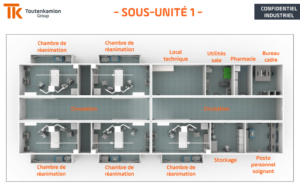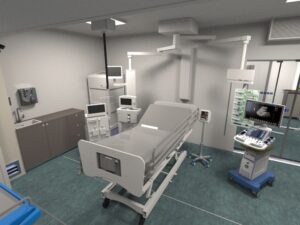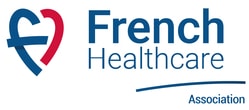Siemens and Toutenkamion Group have developed an agile mobile system for healthcare facilities in order to prepare for future epidemics/pandemics targeted by the WHO.
· Designed to respond to use cases identified by healthcare professionals during the health crisis, these mobile units are a perfect fit for the real needs of healthcare facilities (ergonomics, hospital logistics, the safety of patients
and healthcare staff).
· Their autonomy, their adaptability and their ease of deployment are just some of the benefits that make this a particularly innovative solution with high added value for hospitals.
· The solution complies with the regulations applicable to healthcare facilities.
· It also offers additional functionalities providing a unique service and a rapid return on investment.
Mobile intensive care units to deal with the unprecedented needs of hospitals in the event of an epidemic.
The brutal Covid-19 crisis has forced nursing staff, doctors and hospital managers to devise, as a matter of urgency, practical solutions to cope with the care of major flows of extremely contagious patients, while maintaining other emergency and conventional care. One of the major challenges of the epidemic has been the need to equip and increase the number of resuscitation and intensive care beds.
In response to this need, which is both organisational and technical, Siemens Smart Infrastructure has joined forces with Toutenkamion Group, the European leader in the design and manufacture of customised mobile units. Together they have developed an agile system of highly innovative mobile intensive care units designed for healthcare
facilities. The aim of this solution is to create additional autonomous units that can take the pressure off hospital infrastructures.
In this context, Toutenkamion Group created the skeleton for the mobile units, selected the best materials that are weatherproof and comply with regulatory constraints, particularly in relation to fire (fire resistant and retardant), as well as technical solutions that are compatible with local town planning. With its expertise in mobility, Toutenkamion Group developed a solution which has reduced implementation times and can be moved regularly.
Siemens integrated the technical part inside the modules: electrical distribution, building management systems, fire detection, safety, air treatment, medical gases (production and distribution) and the integration of dialysis solutions through specialist partners: ATA Médical, Novair and Baxter.
Each intensive care unit is comprised of 5 single rooms, a nurses’ station for healthcare professionals, a pharmacy, a technical office, a biomedical equipment store and a dirty utility area for everything that needs to be cleaned as well as a rest room or office for personnel (optional integration of an air lock).
Within these mobile units, Baxter offers extracorporeal renal & multi-organ replacement therapies to support failing organs in intensive care (kidney, lung, liver, heart, blood purification, etc.). If the patient’s situation requires continuing in-centre haemodialysis, Baxter has a wide range of products with an individualised treatment modality depending on the clinical requirements.

Responding to the need of healthcare professionals
In order to offer a solution that satisfies practical use cases, Siemens worked with the technical, property and logistics department at the Pontoise Hospital (GHT NOVO) and spoke to the facility’s intensive care team. Based on their feedback about their frontline experiences and comparing the views of the various professions that have been directly impacted by the Covid-19 crisis, Siemens has developed a solution that is a perfect fit for the real needs of healthcare professionals and patients.
“The Covid-19 crisis has revealed major multi-disciplinary issues in hospitals in France: the organisation of care units, functionality, technical equipment, human resources, regional challenges… We have had to adapt to take care of an unprecedented number of patients at the same time, going from 25 to 62 intensive care beds. Our partnership has enabled Siemens and Toutenkamion Group to develop a solution that takes account of all the sensitive points that we have been able to identify. This will allow us to be better prepared for future epidemics, whether this is a new wave of Covid-19 or other pandemics targeted by the WHO, such as yellow fever or Ebola for example” explained Christophe Perenzin, Director of the Investment, Material Resources, Information System Centre and Director of Estate and Property Investments for GHT NOVO (Pontoise, Beaumont sur Oise, Magny en
Vexin).
Innovation: an ergonomic solution to ensure the safety of patients and healthcare professionals

Patients’ size and the consequences of this for their care was one of the major sensitive points identified by healthcare professionals during the health crisis. Indeed, these professionals need to be able to access and handle the patient easily, despite the patient’s inability to move.
In order to solve this issue, Siemens and Toutenkamion Group are proposing a solution that prioritises ergonomics. Consequently, all the rooms are at least 23m2 (L: 5.75m and W: 4m), which means that healthcare professionals can easily move around the patient and have the space they need to dispense critical care in the event of an emergency without being hampered by the many pieces of medical equipment. Each room is also equipped with a patient lift for moving patients in intensive care.
Fully autonomous and adaptable units
Furthermore, the biomedical equipment and medical gases (oxygen, air and medical vacuum) must be the right size to meet a growing and immediate need as part of a health crisis. To this end, the company Novair, the French manufacturer specialising in medical gas systems and a partner in the solution, has supplied a complete system which can be used to produce and supply the medical gases used in the mobile units in total autonomy, using mobile generators. This autonomy preserves the hospital’s existing stock and network capacities. Environmentally-friendly, the production of medical oxygen on site also has the benefit of eliminating the CO2 emissions generated by delivering liquid or bottled oxygen.
The mobile units are also autonomous in the supply of normal and secured power (3 energy sources), in accordance with Circular DHOS/E4 no. 2006-393 of 8 September 2006 on technical conditions of power supply for public and private healthcare facilities. In addition, they can be adapted and used for purposes other than intensive care in the
event of a pandemic, for example, for works within the hospital. Equipped with ISO 8-class individual air treatment solutions, these units are particularly well suited to house dialysis or haematology units. They can also be supplemented by and connected to other medical and mobile functions already developed by Toutenkamion Group and Siemens (radiology scanner, mammography, ultrasound, etc.).
Unprecedented speed and ease of deployment
One of the major benefits of the solution developed by Siemens and Toutenkamion Group is the speed and ease with which it can be implemented. Indeed, it requires just 8 months from the project’s planning stage to the operational use of the units, including the manufacture and assembly of the modules.
Fully modular, each unit can be extended and transported by exceptional convoy. This flexibility also means that it is easy to dismantle and reassemble each unit (a study of the weaknesses was carried out by Toutenkamion Group), and therefore to move them from one facility to another within the same Regional Hospital Group (GHT) or region depending on the requirements of each site.
The modules also including a geolocation solution, which can be used for the real-time management of their availability and simplify patient transfers between different hospitals.
Press contacts :
CLC Communications
Jérôme Saczewski, Christelle Grelou, Ingrid Jaunet, Orline Nzuzi
Téléphone : 01 42 93 04 04
E-mails : [email protected] – [email protected] – [email protected]
Press release : EN_Siemens SI_TKG_Unites mobiles de reanimation_Aout 2020
